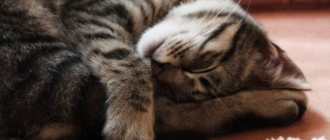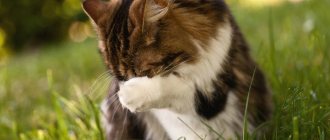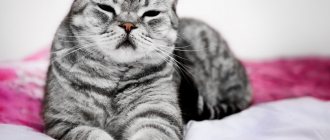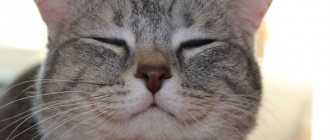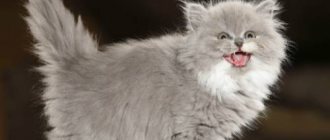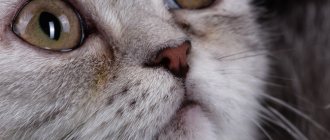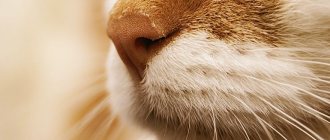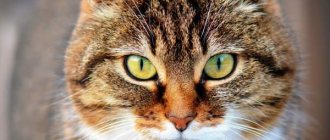You're sitting in your favorite chair when you need to get up to do something important. As soon as you move, your cat takes your place. You return and the cat seems to have been sleeping there for several hours.
Cats will occupy the area that has become hot from where you were sitting. Cats love warmth and will absorb your body heat. Cats also enjoy being around their owners' scent because it makes them feel safe and comfortable. Territorial cats will jump on the seat to claim it for themselves and scare away other animals. The cat may also want to get your attention or cuddle with you when you get home.
When your cat jumps into your seat, it's actually a compliment. Most of the time, she wants to be close to you and feels safe because of your scent. However, these are not the only reasons why a cat takes your place.
Why does my cat jump into my chair when I get up?
Cats love to snuggle up in a soft, comfortable chair, but it can be very uncomfortable when they decide that your chair is what they want. Most owners cannot accept the fact that their happy cats will leave their new sleeping place and move to another place. Why are cats so eager to jump on your chair as soon as you change seats?
The chair is warm
According to the Journal of Physiology, cats can respond to differences between warm and cool temperatures. A cat's paws are sensitive to temperature changes.
As descendants of the African wildcat, cats crave warmth. The average body temperature of cats is 102 degrees Fahrenheit, while that of humans is 97.5 degrees. Most domestic cats are adapted to warmer climates. Those cats that live in colder areas develop thick, fluffy fur to survive, which traps heat and keeps them warm.
However, most domestic cats rely on external heat sources to stay warm, which they sometimes receive through our body heat. Because heat transfers from our body to the seat after sitting for a long time, cats sense the warmth and move there to take advantage of it.
Interestingly, since a cat's fur has insulating properties, it can prevent the animal from realizing that it is too hot. Since our body heat dissipates very quickly from the seat, this will not cause a problem.
Territory marking
Cats produce many different scents to convey messages to other animals. They also find their own scent soothing. The cat will jump on your seat to leave its scent, which will make the smell of the chair more familiar and the environment more comfortable.
If you have other cats in the house, this process shows dominance and allows the cat to mark its territory to alert all other animals.
The cat may also take your place over and over again. While it can be frustrating, if you're comfortable, don't take it personally. Your cat is occupying your chair because she is reusing her scent as it fades. Cats like to know that their scent is present, even if they are in another part of the house.
Also, don't be surprised if your cat sits in a new place for a long time without moving. Cats spend a significant amount of time in one place to make sure it smells like them. If you sit there longer, the smell will be stronger.
Chasing your scent
Cats rely on their sense of smell, which is approximately 14 times stronger than that of humans. In addition, cats have 200 million olfactory receptors that detect odors that we cannot detect. Your scent can help your cat feel comfortable and relaxed, and many cats enjoy being around the scent of their owners.
Cats also have a dual sense of smell. It consists of normal olfactory receptors that detect odors in the air. There is also a second nose called the vomeronasal organ, otherwise known as Jacobson's organ. This organ detects pheromone signatures that most other animals cannot detect.
According to Oncoscience, a cat's well-developed olfactory bulb also contributes to a heightened sense of smell. These pheromones allow cats to recognize their owners. When the owner moves from his place, the cat easily detects these unique pheromones and sits in the same place, closer to the soothing smell.
Wants a reaction
Cheeky cats love to push boundaries and will stop at nothing to get your attention. If you give a positive response in the form of petting and cuddling after your cat steals your space, she will remember this and try to take your place more often.
If you sleep on your stomach
It has been noticed that one of the most favorite “sleeping places” on the human body is the stomach. Considering that cats require more warmth to live a healthy life, they look for the most comfortable and heated place. The belly is just that.
There is no need to exclude the “therapeutic” version. There are many organs located there that may be unhealthy. The sore spot is always hotter, the animal senses this and reaches out to it. By lying on its stomach, giving it its warmth, purring, the pet heals the diseased organ.
There is another interesting point. This applies to women. Many cat owners claim that their pets, like an ultrasound, can sense their owner’s pregnancy. They pay a lot of attention to the tummy, often sniffing it, licking it and trying to lie down closer to the baby.
We recommend viewing
Why do cats change their sleeping places? Why do cats act strange when you scratch the base of their tail? How to keep cats away from bird feeders
Likewise, if a cat realizes that stealing your space will give her the opportunity to cuddle with you, she will do so to get closer to you, not only for the sake of affection, but also for the warmth of your body.
Some cats also see this as a fun game and will jump on your chair to start the game. If your chair is made of soft fabric, be careful when playing with your cat, as its claws can make holes and pull threads out of the material.
Feels safe
Sitting in your chair, you personally marked it as safe. Thus, cats see that this resting place is reliably protected, and they go to bed, knowing that nothing threatens them.
This comes from a time when cats were wild and needed protection from predators. Although cats are primarily predators, injured, vulnerable or small cats become easy prey for larger animals.
So when your cat jumps up on your seat, it really is a compliment. Your pet feels safe enough to let his guard down, knowing that he is protected without fear of a surprise attack. Your cat is part of your family pack, and she feels that way.
Sleeping together at night
Probably, at least once in their life, everyone has had to while away the night with a cat. This creature loves to sleep with a person, but always gives preference to its owner. Why is that? There is also no clear answer to this question. However, why a cat lies on a person at night can be understood by reading different opinions.
- Cats are so proud that they strive to subjugate the person in charge of the house. Lying down next to him at night at the head of the bed, they are thereby, as it were, stronger than their owner.
- The animal loves to control everything, and at night this is how total control over the owner is exercised.
- Cautious lovers of comfort and peace look for the safest place in the house for the night. And where, if not at the head of the house under a barrel, can you relax and not fear for your life.
- Subconsciously sensing a sore spot, the animal seeks to help its friend and breadwinner.
- Cats are often attracted to the pleasant aroma of cosmetics used. They settle on the head and even lick the mistress’s hair.
- The life of a little kitten begins in a large company of sisters and brothers, they eat together, sleep together in warmth and safety. Once in the hands of a person, the baby tries to find in him a replacement for his furry family.
The versions are, of course, controversial, but one cannot but agree: there is something in this!
Is it a problem when a cat takes your stool?
Most often, a cat acts innocently when it takes over your chair after you get up to do something. However, sometimes this may indicate that something is wrong mentally or physically.
Cats that are stressed or trying to get their owner's attention may have physical or mental problems. Here are some reasons why a cat might take your place:
Depression
Depression or sadness in cats is a real cause for concern. When a cat suddenly becomes quiet, a number of issues could be to blame. Changes in personality, poor grooming, and low, mournful meows are signs that your cat is feeling depressed.
Some depressed cats become affectionate and seek to constantly be near their owner to comfort and calm him down. By jumping onto your seat, sad cats have an easy way to approach you, especially if you are likely to be squeezed next to the cat. They also find comfort in your scent.
If you notice that your cat has started jumping up on your seat every time you get up, look out for signs of sadness:
- Changes in vocalization
- Bad body language
- Aggression or fear
- Increased tenacity
- Excessive sleepiness
- Excessive scratching
Behavioral problems
Some cats steal their owners' chairs because they are naughty. Cats have different personalities, and some of them like to play pranks. While many cats are simply playing by jumping on your seat, some are disruptive.
Boredom is often to blame. If your cat lacks mental or physical stimulation, she will exhibit various types of destructive behaviors to get rid of excess energy and get your attention. The more attention you give her, the worse the cat will behave in the future.
The next time your cat jumps on your chair, ignore it. Let her take the chair and protect yourself from bad behavior. Over time, the cat will understand that no one will reward her for bad behavior and stealing a chair.
The cat attacks you
Cats are territorial creatures. If they have taken your chair and now claim it as theirs, they may attack you when you try to get the chair back, scratching or biting you.
The best way to prevent a cat attack is to ignore its unruly or aggressive behavior. Move away from the cat so that she understands that you are not impressed.
Likewise, if you wake a cat to take your place, it may react instinctively because it feels like it is being attacked like a predatory animal.
Cats in the rapid eye movement (REM) stage should not be disturbed as this is when they dream most often. If you wake your cat before she's ready, she'll become confused and you risk injury.
If your cat falls into a deep sleep after taking your place, it's best to leave him alone and find another place to sit.
Where did the belief come from?
There is also a story about where the belief came from.
The cat was brought to ancient Rus' by sailors. The church was involved in breeding domestic animals: they were bred in monasteries, at the royal court, and in peasant houses. Stealing a cat was punishable by a heavy fine. What is the secret to the success of a furry animal?
Rather, popular rumor brought rumors to the Slavs from Europe, where cats have long been considered the guardians of well-being and health in the home. This is how the proverb was born: “There is no hut without a cat.” And then the Slavs began to have signs and superstitions associated with the behavior of the domestic cat.
How to prevent your cat from stealing your seat?
There are times when you want to prevent your cat from sitting on your chair at all. Perhaps your chair is new, or, for example, you have guests. Cats are attracted to furniture, especially if your scent is on it. However, you can make your furniture less attractive by doing the following:
Don't let your cat sit
You can prevent your cat from jumping on your seat by placing something on it every time you stand up. This could be a blanket that you know your cat doesn't like, or anything else that will block your scent and prevent your cat from getting comfortable. At first you may think that you are being mean, but the cat will learn that your place is off-limits.
Provide an alternative place for your cat
If you provide your cat with a more comfortable and better located place, she will be more likely to leave your place alone. Your cat may be happy with a suitable cat bed or a cozy place you make for her.
To encourage your cat to move to a new place, place a blanket or clothes with your scent on it. Cats that want to approach your scent or mark their territory will be attracted to your pheromones and will likely allow you to take their place.
Explanations from scientists and psychics
Scientists from the UK's National University of Therapeutic Effects have proven that a cat's body produces a magnetic field equal in impact to medical equipment. Thus, it strengthens the human immune system and reduces the risk of heart attack.
Bioacoustics specialist Dr. Elisabeth Muchentaller concluded that a cat's purring (at a frequency of up to 45 hertz) stimulates the healing of wounds on the skin and bones, an effect similar to ultrasound.
A cat’s hearing even picks up vibrations and it is possible that it also reacts to changes in the human body, including fatal ones.
Sometimes any pet owner notices that their tailed pet is behaving aggressively, for no reason at all. The reason for this, according to psychics, is some evil spirit, a negative energy substance that the cat picked up. By inappropriate behavior, a pet in a unique way rids itself and its home of a bad entity.
